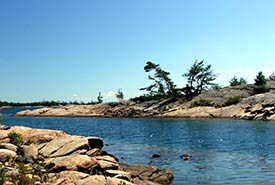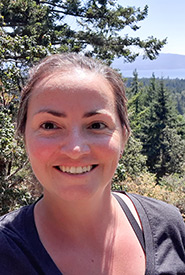Reflections on Land-based connections

Eastern Georgian Bay Coast, ON (Photo by NCC)
I grew up in southern Ontario, playing in the farms and forests of the Oak Ridges moraine north of Toronto, and spending time in the summers at a small, rustic rental cottage on Georgian Bay, just north of Parry Sound.
This cottage was a place where my Dad’s family also visited during his childhood, and somewhere that has always held a special place in my heart. There is something about that escape to the outdoors that is so important as a kid — a break from the social pressures of school, an opportunity to play and explore on no timeline other than your own, to experience the weather, get sand in between your toes, and connect with a place outside of your day-to-day life. It made me laugh to picture my Nana (my dad’s mother) cleaning cloth diapers in the nearby stream when my Dad and his brothers were little. I liked imagining my dad as a child, and being there brought out his inner child. Some of my favourite memories with my dad were made there – playing in the water, climbing on the rocks and creating simple games inside on rainy days.
Both sides of my family are settlers to Canada — arriving by ship in the early 1900s primarily from Scotland, England and Ireland. My dad’s grandfather was born into a family of ship builders in Scotland, but moved to Canada and pursued a passion for visual art. He travelled around Georgian Bay painting landscapes alongside the Group of Seven artists, earning a modest income through exploring his passion. His connection to this landscape, represented through his art, may have contributed to my grandparents’ decision to vacation here with their children in the 1950s. As a settler to Canada, and someone who has moved around a lot in my adult life, this is probably the most deeply rooted connection I have to a place. I haven’t been to Parry Sound in nearly 20 years, but the beauty of the land and memories made there pull at my heart.
This year on National Day for Truth and Reconciliation, I am thinking about that place of my childhood summers, but today it pulls at my heart in other ways. Because while my family was putting down roots and forming memories on Georgian Bay, I recognize that, at the same time, Indigenous Peoples were being uprooted from their lands, separated from their families, dehumanized and traumatized through the residential school system.
It can be hard to acknowledge how that privilege was afforded to me at the expense of others. My ancestors immigrated to Canada at a time when federal policies like the Indian Act, which gave rise to residential schools, were operating in full force. Children were being taken from their homes and abused (an understatement) behind closed doors. Families were separated, relocated, impoverished and punished for not being European in their cultures and world views. The access my family had to these lands to build a life and explore nature was and still remains directly related to the disconnection of Indigenous Peoples from these same lands.
As a kid, my family used to drive through the Wasauksing First Nation reserve on Waaseyakosing (or Parry Island) to explore the ghost town of Depot Harbour. It was a confusing place to observe. It felt different than other communities in the area, yet I did not ask enough questions about why and how things came to be this way. Why were Indigenous Peoples relegated to this specific land and not “allowed” to live with the rest of us? Did they not want to? Who decided things would be this way? These childhood questions were naïve and remained largely unanswered for me for a long time. Each year, when our week at the cottage was over, I would return home, to school and my friends in the suburbs of Toronto, and not think much about the reserve.
As someone who now works for a land conservation organization, and at a time of acknowledgment by Canadian society and the conservation sector, I am starting to answer some of those questions and acknowledge Canada’s dark history. I am learning the history I wasn’t taught in school and discussing these topics at dinner with family and friends; having sometimes hard conversations that were previously pushed aside. I am learning about the philosophical differences in world views between European settlers and Indigenous societies, which were used to justify the actions that created this intergenerational crisis we live with today. This learning has been enabled by the strength and bravery of the Indigenous people who have shared their stories and hope that with understanding, we can carve a new path for Canada.
I have wonderful friends and colleagues who have suffered deeply as a result of Canada’s policies affecting Indigenous Peoples. I can’t erase the ugly parts of Canada’s history, but I can reflect on the work of the Truth and Reconciliation Commission — their report and the 94 Calls to Action — which is a gift, bravely given to all Canadians by those who have suffered, as a road map to a better future. Today, I am reflecting on what still needs to be done in order to find that future.
My land-based connections may not be deeply rooted in time, but they are significant to me. My dad’s memory is failing these days, but my memories of him will forever be embedded within the lands of Parry Sound — this place of my childhood, and my dad’s childhood. If my connection to land holds even a fraction of the meaning it holds for the Indigenous Peoples whose cultures, languages, ancestors and memories are also embedded there, then today I will use that pull in my heart to deepen my understanding of the Indigenous histories and connections to Georgian Bay, how colonization disrupted the connections of the Anishinaabe and Mississaugas First Nations Peoples who were displaced from the lands on which I was raised, and feed the fire of our shared connections to find a better future for the land.


